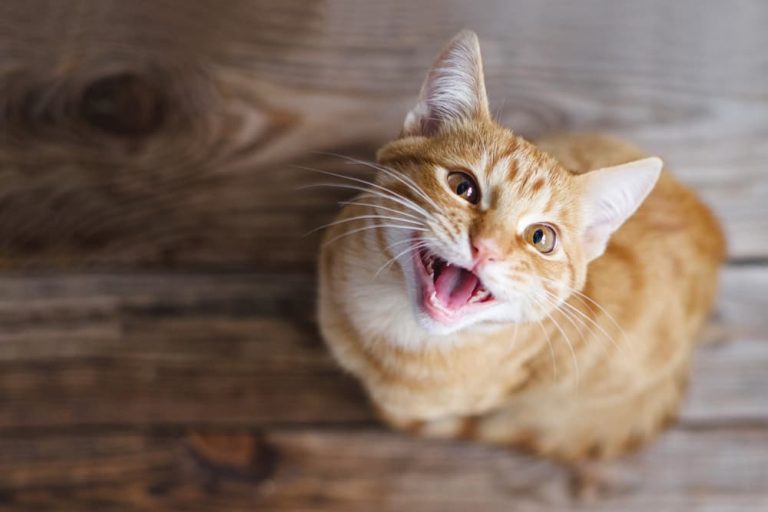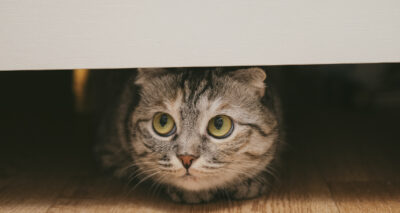Why Does My Cat Meow So Much?

Did you know that while kittens meow at their mother because they are hungry, cold, or frightened, adult cats only use meowing to communicate with humans? That’s right—adult cats will growl, hiss, trill, and yowl to communicate with each other, but to humans they are forever our babies, and they meow to communicate with us or get something they want or need.
Meowing at humans is a normal behavior, but what can you do if your cat meows excessively all the time, or has recently changed from a quiet cat to an overactive talker?
Cat Meowing: How Much is Normal?
Cats use meowing to communicate with us. The most common normal reasons a cat meows are because they want something from you including attention, play, food, to go outside, etc.
A cat will also meow to say hi or to announce their presence. Some cats will meow to themselves as they walk around the house, or they may meow because they are lonely. Female cats in heat will meow to attract a mate.
The amount a cat meows varies between individual cats and between breeds of cats. Bengals, Abyssians, and Siamese cats, for example, are known to be ‘talkers,’ and meow more than your average domestic cat.
When it comes to how much meowing is too much, it is less about the amount of meowing and more about overall changes in your cat’s behavior. Some cats just meow a lot, just like some dogs bark a lot. If your cat has been a lifelong talker, then that is likely normal for your cat. However, if your cat has started meowing more recently, or if your cat’s voice is suddenly louder or softer or different in any way, then something might be going on that is causing excessive meowing.
Why is My Cat Meowing So Much?

If your cat has had a recent uptick in meowing, there is likely something that has changed in your cat’s world. There are many things that can cause increased meowing in cats, including:
Medical conditions. Certain conditions such as hyperthyroidism or general pain can cause cats to vocalize more than usual. In addition, hyperthyroidism causes a cat to be hungry, which can cause increased meowing if your cat normally meows at you to get food.
Boredom or loneliness. When cats are bored or lonely they often use meowing as attention seeking behavior.
Stress or anxiety. If you have had changes in your household or your cat has been stressed for any reason it can lead to increased meowing.
Advanced age. Senior or geriatric cats are more susceptible to old age diseases, including arthritis, hearing loss, vision loss, and dementia, which can lead to increased vocalization especially at night.
Other Symptoms to Watch For
If your cat has suddenly become a meowing over-achiever and it is due to a problem, cats will often drop other clues which can help you understand why your cat is communicating with you more than usual.
Excessive meowing due to a medical condition may include other symptoms such as:
- Changes in weight
- Changes in appetite
- Vomiting
- Diarrhea
- Decreased energy
- Increased energy
- Hiding more than usual
If your cat is older and starts vocalizing more, watch for signs of:
- Vision loss
- Hearing loss
- Dementia
Stress may cause cats to develop cystitis or a urinary tract infection. Watch for the following symptoms of urinary problems in addition to meowing:
- Urinating or defecating outside the litter box
- Straining in the litter box
- Bloody urine
Stress, separation anxiety, or loneliness may also cause cats to display the following behaviors:
- Over grooming that leads to bald patches
- Litter box problems
- Increased hiding
- Acting jumpy or clingy
- Following you more than usual
If your cat is meowing more than normal, it is always a good idea to note any behavior changes and get your cat checked out by a veterinarian to make sure there isn’t an underlying medical cause.
How to Get a Cat to Stop Meowing So Much

While vocalization is normal and healthy for cats, if excessive meowing is interfering with your quality of life then there are strategies you can use to reduce the amount of meows coming from your cat.
If underlying medical problems have been ruled out, then the best thing to do is ignore your cat when they start meowing at you to get something. Do not reward the meowing with treats or attention because this will reinforce the behavior.
Instead, ignore your cat when they are meowing at you and reward them with whatever it is they want when they are being quiet and polite. This may be hard to do in the beginning but eventually they will get the idea.
Additional strategies to reducing excessive meowing include:
Environmental Enrichment
If your cat is bored, invest in environmental enrichment to reduce stress. This involves things like plentiful vertical and horizontal scratching opportunities, increased vertical space and climbing opportunities, outdoor time on a leash or in a Catio, food puzzles and hunting opportunities, etc.
Stress Reduction
Evaluate your cat’s environment for stressors, such as stray cats, overcrowding of cats, not enough resources, etc. and remove or reduce stressors if possible. If you aren’t sure what stresses your cat, here is an educational resource on all things that can stress cats out.
Litter Box Maintenance
Have one more litter box than the number of cats to ensure good litter box hygiene and habits. Clean boxes daily and make sure they are in accessible areas so your cat can easily find them.
Exercise
Increase daily play and exercise sessions to wear your cat out. Cats will be less stressed and lonely if you make sure they get plenty of interaction and activity throughout the day.
Maintain Routine
Cats don’t like changes, so keep feeding, play time, bedtime, etc. at the same time every day as much as possible so your cat knows what to expect and when to expect it.
Utilize Calming Aids
Utilize calming aids for stressed cats, including pheromone diffusers, thundershirts, or Assisi loop technology.
Try Calming Supplements
Calming supplements such as CBD oil, or products that contain l-theanine, milk protein, or tryptophan which can help reduce anxiety that contributes to excessive vocalization. Some cats also benefit from catnip.
Adjust Feeding Schedules
If your cat is bugging you at night for food, try giving your cat a small high protein snack before bed, and consider getting an automatic feeder that will dispense a pre-measured amount of food at the time you determine.
The Conclusion on Excess Cat Meowing
By knowing why your cat is meowing and then employing the strategies listed above you should be able to reduce excessive vocalization in most cats. If you are still hitting a wall, reach out to your local veterinarian for additional tips and tricks that will help your cat be less vociferous.









